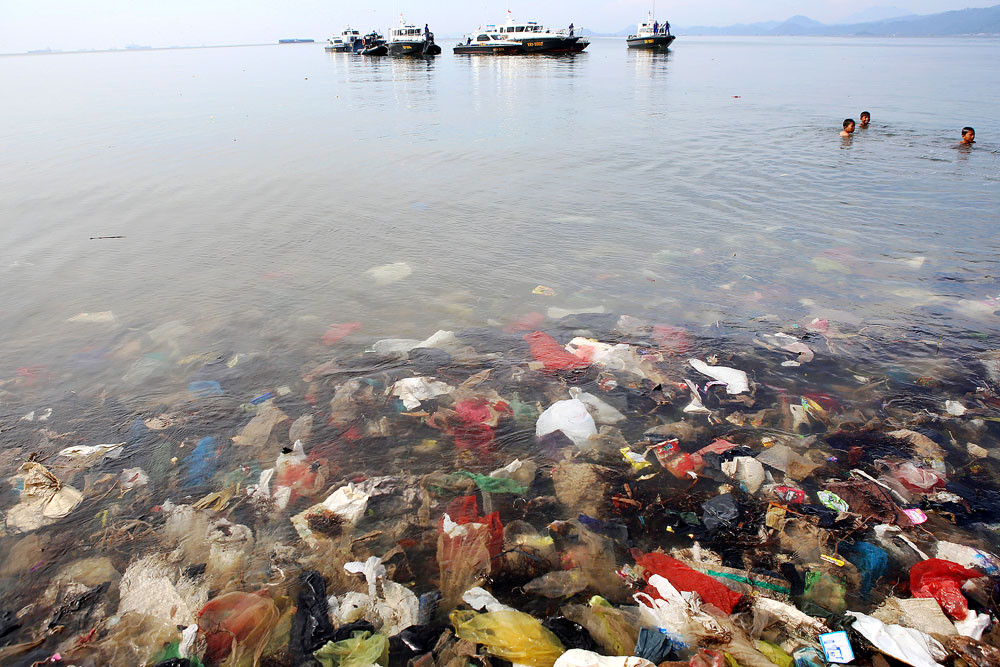Popular Reads
Top Results
Can't find what you're looking for?
View all search resultsPopular Reads
Top Results
Can't find what you're looking for?
View all search resultsThe waste challenge: Is Indonesia at a tipping point?
Change text size
Gift Premium Articles
to Anyone
E
very 20 minutes, the equivalent of a 10-ton truckload of plastic is dumped into the waters around Indonesia. Globally, if this problem goes unchecked, there will be more plastic in the oceans than fish by 2050.
In Indonesia’s case, given that base infrastructure is not keeping up with the rapid rate of urbanization, Indonesia could reach such a dubious milestone ahead of most countries.
Indonesia is estimated to generate over 190,000 tons of waste every day, the majority of which is organic waste.
Plastic constitutes around 25,000 tons per day of which at least 20 percent is believed to end up in rivers and coastal waters.
Of the global plastic waste in the world’s oceans some figures suggest 15 percent comes from Indonesia. This is a global problem on a cataclysmic scale.
Unfortunately, given Indonesia’s geography, scale and population, this country arguably faces the toughest of all challenges.
Residents and businesses in Jakarta probably have no idea where their trash really ends up.
More often than not it will be tipped onto waste dumps such as the colossal 120-hectare, 70-meter high dump in Bantar Gebang.
“Landfills” such as this really did not exist 25 years ago but if waste continues to accumulate at the same growth rate each year in another 25 years Bantar Gebang would grow in excess of 300 ha. Clearly, this situation is not tenable. Across Indonesia, local governments will all be grasping with the same problem albeit on a different scale.
Over in Bali, the stench from the landfill at Suwong near Sanur will be familiar to those of you that have taken the bypass from the airport to Sanur.
There is an increasing frequency of images on social media showing once pristine beaches covered with litter.
The economic cost to the vitally important Indonesian tourist industry would be astronomical if tourists became disillusioned and went elsewhere.
The action the Philippines government took last year when it was forced to close Boracay in order to allow time to address the chronic waste issue there should send a very sobering message.
The good news is that the younger generation are starting to show the type of leadership that was lacking in my generation by making more ethical consumption choices, which in turn is driving consumer brands to develop more environmentally friendly packaging.
The first step to addressing this challenge is to change consumer behavior and that is something I believe is now occurring as consumers are simply better informed. The next step is the implementation of a more properly planned sorting and collection system closer to the point of consumption.
There is an increasing frequency of images on social media showing once pristine beaches covered with litter.
The other good news is that most waste can be treated and recycled. Organic waste can be used as a feedstock to generate electricity. PET and HDPE (materials predominately used for plastic bottles and packaging for liquids) can be recycled. Poor quality plastic can be used to create the equivalent of bio diesel.
The technologies all exist. There is a global investment appetite to fund such projects. So why are we not seeing significant investments in the waste management sector in Indonesia? In a word — policy.
Having worked with a number of potential investors in the waste management sector, all of them express frustration about the lack of a cohesive policy from national to local level.
At an execution level, recycling or waste to energy investors are often required to work with the landfill operators, not all of whom share the same objectives. The government needs to step in and implement the necessary regulations to ensure cooperation at all levels. Indonesia should make attracting investment of this nature a key policy initiative given the wider economic, social and environmental benefits such investment brings with it.
Recent initiatives such as those announced by West Java Governor Ridwan Kamil are a very welcome step in the right direction.
On a global policy level, I am disappointed that my own country is still exporting waste to Southeast Asia, a trade that increased to this region after China closed its doors to waste imports in 2017.
Countries such as Indonesia and Malaysia with their own domestic waste challenges certainly don’t need the United Kingdom (and European Union) dumping their waste on Southeast Asia.
Policymakers in Europe and Southeast Asia should simply agree right now to ban cross border shipments of waste between the two regions. The tipping point has been reached. If in a year’s time no action has been taken I fear it will be too late.
***
The writer is the current chairman of the British Chamber of Commerce and Scotland’s trade envoy to Indonesia.











